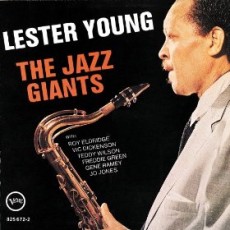
Daily Dose Of Jazz…
Lester Willis Young was born on August 27, 1909 in Woodville, Mississippi and grew up in a musical family. His father, Willis Handy Young, was a respected teacher, his brother Lee Young was a drummer, and several other relatives performed music professionally. His family moved to New Orleans, Louisiana when he was an infant, then later to Minneapolis, Minnesota. His father was a musician, who would teach his son to play the drums, trumpet and violin in addition to the saxophone.
Playing in his family’s band, known as the Young Family Band, vaudeville and carnivals were their circuit but in 1927 he left, refusing to play the Southern states under the racial segregation of Jim Crow laws.
Settling in Kansas City, Missouri in 1933, he briefly played in several bands, then rose to prominence with Count Basie. He would leave Basie to replace Coleman Hawkins in the Fletcher Henderson orchestra, followed by a stint with Andy Kirk, then back to Basie. Lester made small group recordings for Commodore Records, and the sessions became known as the Kansas City Sessions by the Kansas City Seven, playing clarinet and tenor.
After Young’s clarinet was stolen in 1939, he abandoned the instrument until about 1957. He left the Basie band in late 1940, subsequently led a number of small groups that often included his brother, accompanied Billlie Holiday in a couple of studio sessions in 1940 and 1941 and also made a small set of recordings with Nat King in June 1942. It was Holiday who gave Young the nickname “Pres”, short for President.[
In December 1943 Young returned to the Basie fold for a 10-month stint, drafted into the army during WWII and after discharge joined Norman Granz’s Jazz at the Philharmonic troupe in 1946 and for the next 12 years toured regularly with them. He recorded for Verve, Aladdin and Savoy records through the Forties.
From around 1951 Young’s level of playing declined more precipitously as his drinking increased. His playing showed reliance on a small number of clichéd phrases and reduced creativity and originality. His playing and health went into a crisis, culminating in a 1955 hospital admission following a nervous breakdown, emerging improved in 1956. He recorded and toured with Miles Davis and the Modern Jazz Quartet through Europe and had a successful stint in Washington, DC with the Bill Potts Trio.
By 1957 Lester appeared with Billie Holiday, at a time when both were in their declining years, but both gave brilliant and moving performances with Holiday’s tune “Fine and Mellow”. By this time his alcoholism had a cumulative effect and he was eating significantly less, drinking more and more, and suffering from liver disease and malnutrition.
He made his final studio recordings and live performances in Paris in 1959 with drummer Kenny Clarke at the tail end of an abbreviated European tour during which he ate next to nothing and virtually drank himself to death. He died in the early morning hours of March 15, 1959, only hours after arriving back in New York, at the age of 49.


